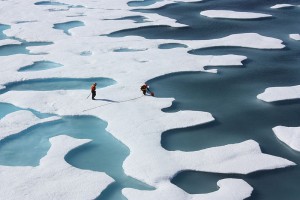With Earth Hour just one day away, climate change has once again become a hot topic—from web news articles to TV segments featuring debates among “experts,” media outlets everywhere are churning out content on our changing climate and what can be done about it. While the media no doubt plays an important role in informing the public on pertinent issues, a recent study conducted by the University of Michigan suggests that we should take the media messages we hear about climate change with a grain of salt.
The study, as reported by the university’s Michigan News, looked at America’s top three broadcast networks—ABC, CBS, and NBC—to see how they approached the topic of climate change in their news segments. Reviewing 440 news transcripts on climate change from the years 2005 to 2011, what researchers found was that while news networks aired segments pertaining to both the impacts of climate change (60%) as well as actions that can be taken against it (59%), they rarely ever discussed both impacts and actions in the same segment (23%).
This may not seem like a big deal, but Sol Hart, who conducted the study with colleague Lauren Feldman, argues that “when information about the threat that climate change poses is not paired with solutions on what can be done in response, individuals may ignore climate messages and be less likely to engage in political action on the issue.”
Other findings of interest were how broadcasters frame climate change impacts, with 54% of segments using environmental frames, followed by public health (13%), economic impact (13%), and national security (8%). In regards to actions taken to addresses climate change, the networks most often framed in terms of conflict between politicians and stakeholders on whether to implement an action, rather than how the action would actually alleviate the problem.
While this study didn’t examine peoples’ knowledge and understanding of climate change, one does not have to look far to see the impact the media has in shaping public opinion. In a fascinating report released last year by the Yale Project on Climate Change Communication, surveys show that despite the near-universal agreement among scientists that climate change is real, there are still some Americans that do not believe it is happening or are unsure.
The way in which the media frames its content and thereby influences public opinion is an area of study that has been of great interest to scholars in recent decades. For more research on the relationship between the media and global warming, check out these three articles from SIMILE: Studies In Media & Information Literacy Education written by Bruce E. Johansen:
In “Media Literacy and ‘Weather Wars:’ Hard Science and Hardball Politics at NASA” (Issue 6.3), Johansen examines the concept of media literacy, looking specifically at the battle waged by James E. Hansen, director of NASA’s Goddard Institute for Space Sciences, against the White House’s “spin control” on climate change, as well as the media’s reaction to this conflict.
In “Political Science: Media Literacy and Global Warming” (Issue 8.3), Johansen looks at the disconnect between the scientific discourse on global warming and the popular discourse, which frames the issue in political or moralistic terms while ignoring scientific data. He provides illustrative examples of the public debate on global warming as well as a discussion of the scientific basics used by media professionals.
In “Political Temperature Rising: Media Literacy, Public Opinion, and Global Warming” (Issue 7.3), Johansen samples the rising volume and intensity of commentary on climate change and questions the quality of this recent “tide,” which typically exhibits the tone of a political campaign or religious revival rather than a scientific debate.
For some more recent articles on climate change in general, check out
“Federalism and Climate Policy Innovation: A Critical Reassessment” (Canadian Public Policy 39, Supplement 2)
“A Tale of Two Climate Policies: Political Economy of British Columbia’s Carbon Tax and Clean Electricity Standard” (Canadian Public Policy 39, Supplement 2)
“A Metamodel of the Oil Game under Climate Treaties” (INFOR: Information Systems and Operational Research 48.4)
What do you think individuals, corporations, and governments can do to address climate change? Tweet us your thoughts @utpjournals!

Comments on this entry are closed.